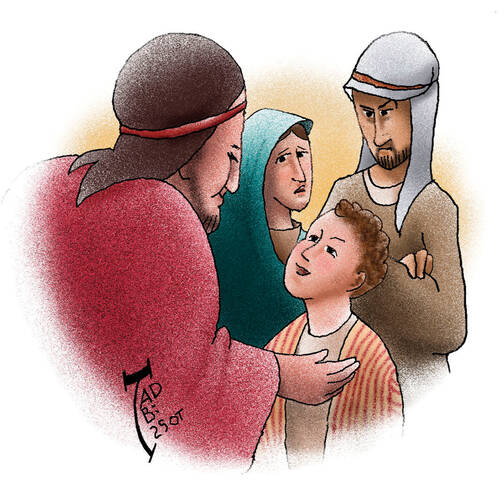Caring for 'the little ones' lives out the Gospel
It feels good to belong—to one’s family, to a group of friends, to a team—to be part of something bigger than oneself. Belonging creates feelings of comfort, joy, peace and purpose. How good must it have felt to be chosen as one of the Twelve Apostles? And to have an inkling, then the growing certainty that the one who chose you is not just a man but the Son of Man, the Messiah. The one who called you to be among the inner circle, to be at the heart of the kingdom-building project, was the one prophesied throughout the ages.
Whatever the ancient Jewish equivalent was of the fist-bump or the “Yes!” while you high-five someone, it’s hard not to imagine the apostles getting a little pumped up about being the chosen Twelve.
This is the general context for understanding their behavior on the way through Galilee, when Jesus was telling them, “The Son of Man is to be betrayed into human hands, and they will kill him, and three days after being killed, he will rise again.” The Gospel of Mark tells us that they did not understand what Jesus was saying and that they “were afraid to ask him.”
Was this fear simply a desire not to hear Jesus, not to distract from their own scenarios of the future? It turns out that they had been arguing among themselves about “who was the greatest.” But this is normal, isn’t it? “I don’t want to be a football player, I want to be the greatest football player!” “I don’t want to be an ordinary baker, I want to bake the greatest loaf of bread this city has seen.” And it does not seem inherently problematic to want to fulfill one’s human abilities and gifts to the best of one’s ability.
So what is the problem with arguing, “I am not just one of the twelve, I am the greatest apostle?” Jesus presents to his apostles a spiritual world in which true greatness is measured not by human striving or boundless ambition but by servanthood. This is a gift and an ability that does not rely on pre-eminence or superiority but on presence for those in need.
It is in caring for the little ones, Jesus says, that his apostles live up to the call of the Gospel. Jesus offers as an example a “little child” (paidion) and says, “Whoever welcomes one such child in my name welcomes me, and whoever welcomes me welcomes not me but the one who sent me.” The treatment of the child becomes the measure of greatness because it demands true humility and service. Loving a child does not offer prestige, honor or wealth, especially when a paidion in antiquity was generally in the care of mothers, nurses or slaves. This was not the work of a man, certainly not the hand-picked viceroys of the Messiah.
Yet the deep wisdom of God is at work here, for we are all children of God, dependent at all points in our lives on the service of others, in varying and different ways. Spiritual humility is not the manifestation of a lack of self-esteem or a sense that we are unloved and unlovable but the acknowledgment that we are dependent upon God and others, even for the genuine gifts and vocations we are to express for others. Our boast must be that we are children of the Lord and that God is our father.
To recognize that we are called as disciples of Jesus is to be at the service of others, especially children and all others who are vulnerable, marginalized and otherwise forgotten. Servanthood orients our relationships with others, for when our desires are out of order, as James writes, our relationships become disordered: “Those conflicts and disputes among you, where do they come from? Do they not come from your cravings that are at war within you?”
We fulfill these cravings when we belong, when we are loved, and when we are part of something. Jesus calls us to the church for this purpose, to care for those whose own hopes for belonging have been dashed. When we bring our manifold human gifts to the service of others, true greatness emerges with every act of love and every word of compassion.
This article also appeared in print, under the headline “The Greatest ,” in the September 14, 2015, issue.








